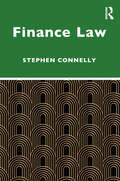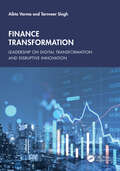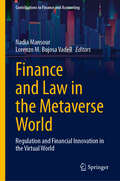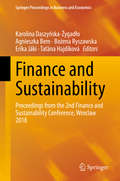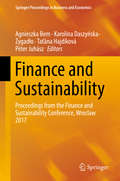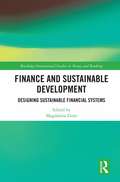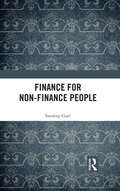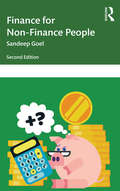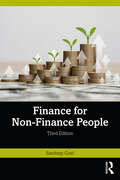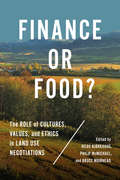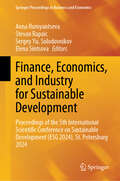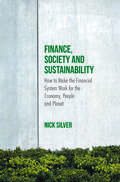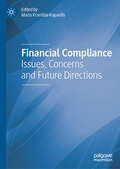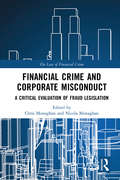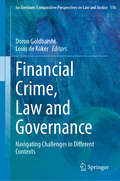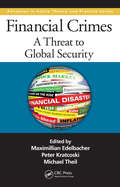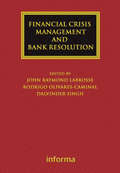- Table View
- List View
Finance Law
by Stephen ConnellyFor the student who wishes to understand law as it is practised in a modern financial context, Finance Law offers the only up-to-date university-level textbook which explains legal principles as they are applied in today’s advanced financial transactions.Essential for any student or researcher seeking an introduction to this complex and fast-moving world, this text: is based on the author’s extensive teaching experience in finance law covers the modern form of credit facilities agreements, security, syndication, securities and securitization, derivatives, and payment and clearing systems is packed with interesting case studies, including the Mozambique Tuna Bond Scandal, the takeover of Manchester Utd plc, and the securitization of student loans motivates study with theoretical discussions and historical contextualisation explains key transaction structures, such as investment grade lending to groups, intercreditor agreements, interest rate swaps, and multilateral payment systems grants insight into key legal principles and structuring applicable to trillion dollar deals across the globe is written by a structured finance practitioner and academic with extensive post-qualification experience of advising lenders, corporate borrowers and sovereigns on international finance Designed for final-year undergraduates and LLM students, Finance Law is not only the perfect accompaniment to any finance module, but can support any advanced programme on insolvency law, mergers and acquisitions (M&A), corporate governance, international economic law and more.
Finance Transformation: Leadership on Digital Transformation and Disruptive Innovation
by Tarnveer Singh Aikta VarmaFinance Transformation: Leadership on Digital Transformation and Disruptive Innovation is a general and wide-ranging survey of finance transformation and emerging technologies. Finance and IT have long been important areas of any business, but recent technological developments are innovating and disrupting both. This book lays a path towards the benefits and away from potential risks. It covers the widest array of topics, from quantum computing to blockchain technology, from organisational culture and diversity to hybrid working, and from regulation to cybersecurity. Written by two vastly experienced industry professionals, this book includes real-life examples and up-to-date references. It will be of particular interest to business stakeholders, executives, and policymakers.
Finance and Law in the Metaverse World: Regulation and Financial Innovation in the Virtual World (Contributions to Finance and Accounting)
by Nadia Mansour Lorenzo M. Bujosa VadellThis edited volume examines the impact of the metaverse on finance and law. As the commercial development of the internet and digital technology has done for more than thirty years, the metaverse phenomenon raises questions about the relevance of existing legal rules in dealing with new practices: between the need for adaptation, evolution, or new rules. While the Blockchain ecosystem has developed steadily over the last few years and its applications are still evolving, can we assume that the metaverse will become "the most prodigious phenomenon of the 21st century"? The term metaverse refers to a virtual world. Technically, using known but evolving technologies, the term refers to a network of 3D virtual worlds. In its current state of development, there is a metaverse and not a single virtual world as there is an internal one, simply because its development is still dependent on proprietary technologies. The development of the metaverse is no less accurate, and a few recent examples suggest that lawyers will not be able to escape this phenomenon, which looks set to involve individuals, companies, and institutions. The financial world is not immune to the emergence of the metaverse either. Traditional finance is moving into new virtual worlds. Several banks and insurance companies are entering this world, far removed from their traditions. Some have even set up branches there. However, what are these financial institutions trying to achieve by entering this market segment? This book addresses these questions with contributions from academics and experts from both fields.
Finance and Sustainability: Proceedings from the 2nd Finance and Sustainability Conference, Wroclaw 2018 (Springer Proceedings in Business and Economics)
by Agnieszka Bem Karolina Daszyńska-Żygadło Taťána Hajdíková Bożena Ryszawska Erika JákiThis volume presents the proceedings of the ZAFIN Finance and Sustainability conference, organized by the Wroclaw University of Economics in cooperation with Corvinus University of Budapest and the University of Economics in Prague. The contributing authors analyze a variety of issues concerning recent finance problems, including corporate finance, public finance, monetary and fiscal policy issues, and risk management. The book also addresses topics connected to sustainable finance, the transition to green economies, corporate sustainability and sustainable development. The target audience for this book includes researchers at universities and research and policy institutions, graduate students, and practitioners in economics and finance working for private or government institutions.
Finance and Sustainability: Proceedings from the Finance and Sustainability Conference, Wroclaw 2017 (Springer Proceedings in Business and Economics)
by Péter Juhász Agnieszka Bem Karolina Daszyńska-Żygadło Taťána HajdíkováThis volume covers the proceedings of the ZAFIN Finance and Sustainability conference, organized by the Wroclaw University of Economics in cooperation with the Corvinus University of Budapest and the University of Economics in Prague. The authors analyze a variety of issues related to recent finance problems, including corporate finance, public finance, monetary and fiscal policy issues, and risk management. The book also discusses topics related to sustainable finance, the transition to green economies, corporate sustainability and sustainable development. The target audience for this book includes researchers at universities and research and policy institutions, graduate students, and practitioners in economics, finance and international economics working for private or government institutions.
Finance and Sustainable Development: Designing Sustainable Financial Systems (Routledge International Studies in Money and Banking)
by Magdalena ZioloThere are many studies confirming the relationship between financial systems and economic development, but there are few which examine the degree to which financial systems a) impact the quality of information, b) influence sound corporate governance, c) ensure effective mechanisms of risk management, d) mobilize savings and f) facilitate trade. In the context of sustainability, there should also be a line of inquiry into how a particular financial system influences the assurance and implementation of sustainable development principles and goals. This book delivers a methodological approach to designing and assessing sustainable financial systems. It provides an original contribution by prioritizing ESG factors in the decision-making process of financial institutions and identifying their impact on sustainable financial systems. The author argues that to achieve financial stability, it is necessary to have in place mechanisms designed to prevent financial problems from becoming systemic and/or threatening the stability of the financial and economic system, while maintaining (or not undermining) the economy’s ability to sustain growth and perform its other functions. The book primarily takes a simulation and experimental approach. It is the first book to take such a comprehensive look at sustainable financial systems as opposed to sustainable finance in general. It will appeal to academics, students and researchers in the fields of economics, finance and banking, business, management and political and social sciences.
Finance for Non-Finance People
by Sandeep GoelFinance is key to every business organization as well as outside. This book makes sense of the finance world from a non-finance perspective. It introduces, explains and demystifies essential ideas of business finance to those who do not have financial background or training. Lucid, accessible yet comprehensive, the book delineates the financial workings of businesses and offers an overview of corporate finance in the global context. The volume: Contains effective tools for financial communication, monitoring, analysis and resource allocation Provides important learning aids such as figures, tables, illustrations and case studies Highlights fundamental concepts and applications of finance Surveys global corporate practices, recent trends and current data A guide to building financial acumen, this book will be a useful resource for executive and management development programmes (EDPs & MDPs) oriented towards business managers, including executive MBA programmes. It will benefit business executives, corporate heads, entrepreneurs, government officials, teachers, researchers and students of management and business besides those who deal with finance or financial matters in their daily lives.
Finance for Non-Finance People
by Sandeep GoelFinance is key to every business organisation as well as outside. This book makes sense of the finance world from a non-finance perspective. It introduces, explains and demystifies essential ideas of business finance to those who do not have financial background or training. Lucid, accessible yet comprehensive, the book delineates the financial workings of businesses and offers an overview of corporate finance in the global context. The volume: Contains effective tools for financial communication, monitoring, analysis and resource allocation Provides important learning aids such as figures, tables, illustrations and case studies Highlights fundamental concepts and applications of finance Surveys global corporate practices, recent trends and current data This updated second edition contains new sections on Tax Planning, including Income Tax and Goods and Services Tax in India. A guide to building financial acumen, this book will be a useful resource for executive and management development programmes (EDPs & MDPs) oriented towards business managers, including MBA programmes. It will benefit business executives, corporate heads, entrepreneurs, government officials, teachers, researchers and students of management and business besides those who deal with finance or financial matters in their daily lives.
Finance for Non-Finance People
by Sandeep GoelThis book makes sense of the finance world from a non-finance perspective. It introduces, explains and demystifies essential ideas of business finance to those who do not have a financial background or training. The book delineates the financial workings of businesses and offers an overview of financial management in a global context. The volume: Discusses fundamental concepts and applications of accounting and finance at the global level Contains effective tools for financial analysis, communication, monitoring and resource allocation Provides important instructional aids such as figures, tables, illustrations and real-world corporate case studies to facilitate learning Is concise in form yet comprehensive in content, delivering in-depth coverage of the five key constituents and entire gamut of the finance domain – financial accounting, cost accounting, financial management, financial markets and tax planning Is thoroughly updated with the latest concepts, international corporate practices, recent trends and current data with a vivid visual impact for a pleasurable reading and learning experience. Lucid, accessible and comprehensive, this third edition is a revised version in accordance with the current finance laws, practices and data. A guide to building financial acumen and literacy, it will be a useful resource for executive and management development programmes (EDPs & MDPs) oriented towards business managers and management students, including MBA programmes, and allied disciplines of commerce, finance, economics and others. It will also benefit business executives, corporate heads, entrepreneurs, government officials, academicians of business and allied disciplines, as well as those who deal with finance or financial matters in their daily lives.
Finance or Food?: The Role of Cultures, Values, and Ethics in Land Use Negotiations
by Philip McMichael Hilde Bjørkhaug Bruce MuirheadExploring the ways in which culture, systems of value, and ethics impact agriculture, this volume addresses contemporary land questions and conditions for agricultural land management. Throughout, the editors and contributors consider a range of issues, including pressure on farmland, international and global trade relations, moral and ethical questions, and implications for governance. The focus of Finance or Food? is land use in Australia, Canada, and Norway, chosen for their commonalities as well as their differences. With reference to these specific national contexts, the contributors explore political, ecological, and ethical debates concerning food production, alternative energy, and sustainability. The volume argues that recognition of food, finance, energy, and climate crises is driving investments and reframing the strategies of development agencies. At the same time, food producers, small farmers, and pastoralists facing eviction from their land are making their presence felt in this debate, not just locally, but in national policy arenas and international fora as well. This volume investigates the many ways in which this process is occurring and draws out the cultural implications of new developments in global land use. An important intervention into a timely debate, Finance or Food? will be essential reading for both academics and policymakers.
Finance, Economics, and Industry for Sustainable Development: Proceedings of the 5th International Scientific Conference on Sustainable Development (ESG 2024), St. Petersburg 2024 (Springer Proceedings in Business and Economics)
by Anna Rumyantseva Elena Sintsova Stevan Rapaic Sergey Yu. SolodovnikovThis book explores business and governance solutions for achieving the Sustainable Development Goals (SDGs), adopted by all UN member states in 2015. It features the proceedings of the 5th International Scientific Conference on Sustainable Development (ESG 2024), held in St. Petersburg in 2024. Without adequate funding to invest in sustainable development and the transformation of energy and food systems, countries and companies cannot achieve stable financial positions. To meet the SDGs, all nations and businesses must invest in renewable energy, universal social protection, quality education, decent jobs, universal health coverage, sustainable food systems, infrastructure, and digital transformation. Incentives for SDG achievement address financing needs through a combination of various forms and mechanisms. Implementing these incentives will also necessitate broader changes in both national and international financial architectures. The book covers a range of fields, including sustainable development for the national and global economy, sustainable development in industrial and financial policy, financing sustainable transformations in industry, finance, and management, sustainable development principles in tax systems, and impact of sustainable development on financial markets among other topics. The book is intended for scholars and professionals involved in public and corporate finance, financial accounting and auditing, sustainable development risk management, economic growth, macroeconomics, monetary policy within a sustainable development environment, public and corporate governance, as well as corporate communications and public relations.
Finance, Innovation and Corporate Sustainability: The Impact of Proactive Environmental Strategy on Firm Performance (Routledge Studies in the Economics of Business and Industry)
by Balamurugan Balusamy Daniel Arockiam Sonal Trivedi Krishnaraj Nagappan Dinesh Krishnan SubramaniamThis book explores how the problem of global sustainability could turn into a major force for innovation leading to enhanced firm performance. It addresses whether proactive environmental strategy and innovation are integrated with a firm’s performance. The goal of this book is to advance the rapidly developing field of sustainable business beyond the straightforward logic of cost, waste and risk reduction.The authors offer significant insight into how internal—life cycle design—and external—image and reputation—innovation strategies serve to mediate and possibly reinforce one another by investigating the relationship between proactive environmental strategy and innovation in relation to firm performance. The book includes empirical research, case studies and real-world examples as well as lessons learned from the successful and unsuccessful transformation initiatives of numerous international companies.This book is primarily aimed at an academic audience of scholars, researchers and advanced students in the fields of finance, economics, sustainability, innovation and environmental studies and will also appeal to practitioners and industry experts in these areas.
Finance, Innovation and Geography: Harnessing Knowledge Dynamics in German Biotechnology (Routledge Studies in Innovation, Organizations and Technology)
by Felix C. MüllerThe overarching aim of Finance, Innovation and Geography: Harnessing Knowledge Dynamics in German Biotechnology is to explore linkages between geographies of finance and relational geographies of innovation. This is achieved by questioning how investment activities affect the unfolding of innovations and in turn are affected by it. This book focuses on biotechnology innovation processes from the perspective of relational economic geography. It reconstructs the unfolding in time and space of eight innovations in German biotechnology. Each one is represented in a qualitative case study. The analysis focuses on the relational work of building, transforming, ending and replacing of collaborative relationships and organizational arrangements surrounding emergent innovations ・ including investment relations and relational work by investors. In this way, the contribution of investors to unfolding innovations is studied with sensitivity to context and situated interactions. The geography of these dynamics is conceptualized by drawing on the recent literature on relational proximity and distance as well as ideas of materiality and space. This book provides a unique perspective, and shows that innovation paths are strongly interwoven with local and temporary opportunities as well as crises, and that investment is embedded in these dynamics. This is essential reading for students and academics of both economics and innovation.
Finance, Law, and the Crisis of COVID-19: An Interdisciplinary Perspective (Contributions to Management Science)
by Nadia Mansour Lorenzo M. Bujosa VadellThis book analyzes the impact of Covid-19 in different areas such as corporate social responsibility and legislation in SMEs, insolvency law, behavioral finance, government interventions in markets, financial disclosure, the emergence of unregulated financial sectors, the increase of coronavirus-related crimes, and the development of banking regulations in the Covid-19 pandemic, among others.The coronavirus epidemic, which has spread throughout the world, has highlighted the inadequacies of the health and social systems of all states, even the most advanced. The health emergency has required extraordinary measures, especially at the level of laws that are essential for the preservation of lives, health, and livelihoods. The priority for governments and even the international community was, from the outset, to prevent infections and care for those affected. Such a strategy required an unusual increase in health spending, even though it exceeded the State's financial capacity and lacked fiscal space. In addition to this challenge, which has not yet been overcome, there is another, that of redressing the consequences of the measures taken (general containment). It should be pointed out that during health crises, the state may have to review the requirement for transparency because of the emergency, but not free itself from it. The urgency could never be an alibi for a violation of citizens' rights and freedoms.With urgency, financial management systems must be flexible and responsive to all occurrences, while ensuring optimal use of resources and minimizing the risks of fraud and corruption.
Finance, Society and Sustainability: How to Make the Financial System Work for the Economy, People and Planet
by Nick SilverThis book is a critical analysis of the impact of the financial system on the economy, society and the natural environment. It cuts through the noise to looks at its purpose, its activities, and what it does in practice.Unlike other books that cover the last financial crisis and the risk of another one; this book is about the consequence of the financial system continuing in its current form. It argues that the financial system is a construct of flawed economic theories, designed in the hope that the market will efficiently allocate society’s capital. Instead, the finance sector allocates savings and investment to maximize its own revenues, with resulting collateral damage to the economy, society and the environment.Although governments try to preserve and regulate the existing system, it is being replaced by a new system driven by technological innovation. The book describes the opportunities this presents for a renaissance of the financial system to actually meet the needs of society, and to re-engineer our economy to avoid environmental crisis.The book is for anyone who would like to understand the finance system’s purpose, what it does in practice and its impact on the real world. For those working in the industry it provides an overview of the system, their place within it, and how to bring about change. For students and academics it provides a valuable critique of the financial system, and the theories on which it is based. For financial policymakers and regulators it identifies key challenges in their activities.
Financial Compliance: Issues, Concerns and Future Directions
by Maria Krambia-KapardisThis book explores the fundamental elements and risks that impact the compliance officer’s work. Following a comprehensive understanding of the role of a compliance officer, by engaging with themes of compliance officers’ liability, expectations, risks and effectiveness, it provides practical answers by leading academics and practitioners in the field. This work also draws on how other areas, such as GDPR, financial regulation and whistleblowing, challenges on compliance officers and provides a way forward to convert these challenges into opportunities. The discussion of compliance challenges and practices in Australia, Europe and the United States provides critical insights into the development of compliance in today’s financial environment. Financial Compliance: Issues, Concerns and Future Directions provides an invaluable working resource for academics, practitioners and a general audience interested in understanding and developing an effective compliance culture.
Financial Crime and Corporate Misconduct: A Critical Evaluation of Fraud Legislation (The Law of Financial Crime)
by Chris Monaghan and Nicola MonaghanThe Fraud Act 2006 presented a wholesale reform of the pre-existing deception offences under the Theft Act 1968 and Theft Act 1978. This edited collection offers a critical evaluation of fraud legislation and provides a review of the Fraud Act 2006 within the context of measures introduced within the previous decade to combat financial crime, fraud and white-collar offences. The edited collection brings together contributors from a range of unique perspectives including academics, practitioners and a former member of the judiciary. It covers several related themes and provides the reader with a unique and original commentary on how the Fraud Act 2006 has been applied by the courts, the type of prosecutions that have taken place, the effectiveness of the Act, and other legislation which is used to prosecute financial crime and corporate misconduct. It covers procedural and evidential aspects relating to fraud trials, namely consideration of the composition of the tribunal of fact in complex fraud trials, and good character directions in fraud trials. It will be of interest to those teaching and researching in Financial Crime, Corporate Law, Criminal Law, the Law of Evidence, Criminology, Criminal Procedure and Sentencing.
Financial Crime and Knowledge Workers
by Petter GottschalkFinancial Crime and Knowledge Workers examines the role of lawyers in court cases involving white-collar crimes, revealing fresh insights into the relationship between a lawyer's stature and a case's potential verdict.
Financial Crime and the Law: Identifying and Mitigating Risks (Ius Gentium: Comparative Perspectives on Law and Justice #115)
by Doron Goldbarsht Louis De KokerDive into the intricate realm of modern financial crime combating with this latest collection. Edited by global experts and featuring contributions from leading international scholars, the collection spans a spectrum of financial crimes, including crypto crime, terrorist financing, illegal logging, and money laundering. The collection provides focused insights into institutional risk-based compliance, offering perspectives on practices employed by banks and challenges faced in implementing risk-based measures to combat the financing of weapons of mass destruction. Additionally, it explores the interplay between cannabis regulation and money laundering. The collection raises thought-provoking questions about the effectiveness and efficiency of the risk-based approach to financial crime. It explores the evidence supporting its implementation and whether it has proven to be the best alternative. Specific concerns regarding bias and discrimination, especially in relation to mutual evaluations conducted by the Financial Action Task Force, are addressed. In light of these concerns and current evidence, the collection provides constructive proposals and enhances the understanding of the challenges that need to be navigated in the ongoing fight against financial crime. This book a product of the Financial Integrity Hub (FIH), is essential reading for professionals, scholars, and anyone interested in staying ahead in the ever-evolving landscape of financial crime risk management. Chapters "The Crime-Crypto Nexus: Nuancing Risk across Crypto-Crime Transactions" and "The FATF’s Combating of Financing of Proliferation Standards: Private Sector Implementation Challenges" are available open access under a Creative Commons Attribution 4.0 International License> via link.springer.com.
Financial Crime in Romania: A Community Pulse Survey (SpringerBriefs in Finance)
by Monica Violeta Achim Robert W. McGeeThis book explores financial crime and corruption in Romanian society based on a community pulse study. It examines the main behavioral patterns of Romanian society in relation to financial crime variables such as tax compliance, tax morale, corruption in public institutions, and money laundering. The authors also investigate how various demographic aspects (e.g., age, gender, region, professional status, education, etc.) are associated with financial crime. The results of the enclosed survey help policy makers consider best practices in financial governance to reduce the level of financial crime in the region.
Financial Crime, Law and Governance: Navigating Challenges in Different Contexts (Ius Gentium: Comparative Perspectives on Law and Justice #116)
by Doron Goldbarsht Louis De KokerEmbark on a journey through the dynamic landscape of global financial crime combating with our latest collection, meticulously curated by leading researchers. At the intersection of finance, technology, law, governance, and international cooperation, this multidisciplinary exploration offers profound insights into the nuanced world of financial crime across diverse jurisdictions, including Australia, Germany, New Zealand, Nigeria and the United Kingdom. Discover a wealth of knowledge as contributors investigate facets such as asset forfeiture, non-conviction-based asset recovery, money laundering in the real estate sector, and the challenges and opportunities posed by new technologies and fintechs. Unravel the crypto crime and terror nexus and explore the necessity of public–private collaboration to combat the abuse of Non-Fungible Tokens. Dive into policy approaches, including the WireCard scandal, and understand how good governance, both public and corporate, remains paramount in the fight against financial crime. As we navigate an age of intergovernmental rulemaking, the collection emphasizes the crucial role of robust governance frameworks and examines the impact of permissive regulation on practices in the City of London. Delve into discussions on crime risk, risk management, de-risking, and the potential consequences of overcompliance and conservative risk approaches on financial exclusion levels. While global standards on financial crime have solidified over the past three decades, the future direction of standard-setting and compliance enforcement remains uncertain in our complex global political landscape. The collection concludes by pondering these current challenges, offering a thought-provoking exploration of what lies ahead. This collection a product of the Financial Integrity Hub (FIH), serves as a valuable resource for financial regulators, compliance officers, and scholars, offering profound insights and perspectives to navigate the dynamic landscape of financial crime combatting. Chapters "Non-Conviction-Based Asset Recovery in Nigeria – An Additional Tool for Law Enforcement Agencies?", "'De-risking’ Denials of Bank Services: An Over-Compliance Dilemma?" and "Terror on the Blockchain: The Emergent Crypto-Crime-Terror Nexus" are available open access under a Creative Commons Attribution 4.0 International License via link.springer.com.
Financial Crimes and Existential Philosophy
by Michel DionThe aim of this book is to deepen our understanding of financial crimes as phenomena. It uses concepts of existential philosophies that are relevant to dissecting the phenomenon of financial crimes. With the help of these concepts, the book makes clear what the impact of financial crimes is on the way a human being defines himself or the way he focuses on a given notion of humankind. The book unveils how the growth of financial crimes has contributed to the increase of the anthropological gap, and how the phenomenon of financial crimes now distorts the way we understand humankind. Using the existential philosophies of Kierkegaard, Nietzsche, Jaspers, Buber, Heidegger, and Marcel, the book sheds light on how these philosophies can help to better perceive and describe financial crimes. Next it looks at prevention strategies from an organizational perspective, using concepts of Sartre, Gadamer and Tillich. The book provides readers with existential principles that will help them be more efficient when they have to design and implement prevention strategies against corporate crime.
Financial Crimes: A Threat to Global Security
by Maximillian Edelbacher, Peter Kratcoski and Michael TheilFinancial market reform has focused chiefly on the threats to stability arising from the risky, uncontrolled activity of the leaders of financial institutions. Nevertheless, organized crime, white-collar crime, and corruption have a huge impact on financial systems worldwide and must also be confronted if true reform is to be achieved. A collection
Financial Crimes: A Threat to Global Security (Advances in Police Theory and Practice)
by Peter Kratcoski Michael Theil Maximillian EdelbacherFinancial market reform has focused chiefly on the threats to stability arising from the risky, uncontrolled activity of the leaders of financial institutions. Nevertheless, organized crime, white-collar crime, and corruption have a huge impact on financial systems worldwide and must also be confronted if true reform is to be achieved. A collection
Financial Crisis Management and Bank Resolution
by Dalvinder Singh John Raymond LaBrosse Rodrigo Olivares-CaminalFinancial Crisis Management and Bank Resolution provides an analysis of the responses to the recent crisis that has beset the international financial markets taking a top down approach looking at the mechanisms to manage a financial crisis, to the practicalities of dealing with the resolution of a bank experiencing distress. This work is an interdisciplinary analysis of the law and policy surrounding crisis management and bank resolution. It comprises contributions from a team of leading experts in the field that have been carefully selected from across the globe. These experts are drawn from the law, central banks, government, financial services and academia. This edited collection will provide a new and important contribution to the subject at a crucial time in the debate around banking resolution and crisis management regimes, and help to plug the gap in our knowledge and understanding of the law of bank resolution and restructuring.
